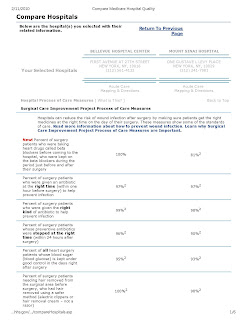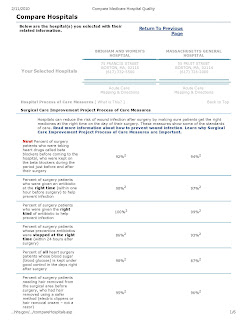Massachusetts Attorney General Martha Coakley recently released a
report which showed that prices paid to healthcare providers in MA vary significantly based on market leverage/position - Partners Health Care (consisting of two biggest healthcare bully in the state - Brigham and Women's and Massachusetts General Hospital) being the exemplary culprit. Due to size and its brand name, Partners Health Care is a successful oligopoly that has pressured other Boston hospitals down a competitive, cost-inflating path, charging exorbitant costs and initiating medical arms race including acquisitions of surgical robots which have not been shown to be superior to human surgeons.
More importantly, Coakley's report showed what the higher price tags DID NOT correlate to. Price variations do not reflect:
(1) higher quality of care
(2) the sickness or complexity of the population being served
(3) the extent to which a provider is responsible for caring for a large portion of patients on Medicare or Medicaid
(4) whether a provider is an academic teaching or research facility
(5) differences in hospital costs of delivering similar services at similar facilities.
HealthBeat broke the report down into chewable pieces
here.
In the medical field, Partners Health Care hospitals set the bar in medicine. They train the best and brightest residents and house world experts in many medical fields - their faculty members write game-changing articles and author respectable medical sources like Uptodate. In my personal experience, working in a Partners hospital resemble working in a perfect bubble - all the medical staff were top-notch, the wealth of resources made the most cutting edge tests/studies possible, almost all patients were insured, white, English-speaking middle-class who could advocate for themselves.
It's counter-intuitive to think that this perfect medical setup does not necessarily improve outcomes, but Coakley's report is not alone - try playing around with
HospitalCompare and you'll find that Mass General or Brigham have worse outcomes than a cheaper institution like Bellevue, a community hospital in NYC. It is important to note that the outcomes measured are simple, objective yardsticks that should apply to all hospitals regardless of the complexity of their patient population. For example, smoking cessation counseling could and should be given to all smokers regardless of how complicated their sickness is.
Some may argue that these measures are too simple and do not reflect the ability to treat complicated cases that are often referred to brand name hospitals, like saving patients from an extremely rare malignancy. In medicine we have a saying that if you hear hoof sounds, they probably belong to horses and not zebras. Curing extremely rare malignancies is a zebra - most cases are horses of patients coming in with a heart attack, a common condition that most hospitals can treat effectively without a perfect setup, the most cutting-edge medical technology or world experts in cardiology, which is how things should be. Any average medical facility should be able to treat common conditions as well as more famous institutions, because that is what an average hospital should be able to do - treat common conditions. Not everyone can or should go to Brigham for an x-ray of a fractured wrist - we have gotten so good with this age-old technology that most hospitals can produce the same, accurate results, for much less than what is charged at brand name hospitals.
What we need to realize is this: most common causes of morbidity and mortality are, for lack of a better word, common. What we see in this healthcare system are horses, not zebras, and because they are common, we have devised cost-effective, time-tested treatments that we should use instead of shiny, experimental treatments that cost much more without proven benefit. An inflamed appendix can be as safely and effectively removed by human surgeons, much more cheaply than using a robot. This is why brand name hospitals providing the most advanced medical technology are not necessarily better for your health or your pocket.
In medicine, less is more. A good doctor should be good at keeping you out of the hospital - they should not aim to excel at providing the most invasive of treatments often advertised by marquee hospitals, but unfortunately doctors and hospitals get paid much more doing the latter. The only thing preventing this blatant conflict of interest from completely wrecking our health care system is human conscience, which is not without fallacy. A better system would reward outcomes, not volume or technology used. Until we get a new carrot on the stick, our healthcare system will continue to be overused and overpriced.




